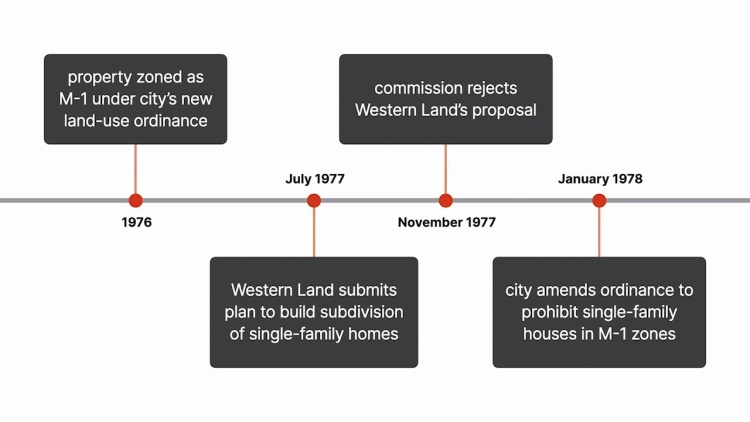Western Land Equities, Inc. v. City of Logan
Utah Supreme Court
617 P.2d 388 (1980)
- Written by John Yi, JD
Facts
In 1969, Western Land Equities, Inc. (Western) (plaintiff) purchased property in the City of Logan (defendant). In 1976, the property was zoned M-1, a mixed manufacturing and single-family-dwelling zone. In July 1977, Western sought approval to build single-family homes on its 18 acres. In October, the city planning commission declared its opposition to subdivisions in M-1 zones and officially rejected Western’s plan in November on the grounds that the proposed residential subdivision was contrary to the zoning ordinance and the city’s master plan, the access roads in the plan would undermine fire protection, and the location of train tracks on three sides of the subdivision made residential use inappropriate. In January 1978, the city amended its zoning ordinance to prohibit the subject property from being used for residential purposes. Western sued in district court to declare that it had a vested right to develop its property and to estop the city from withholding its approval. The city argued that a building permit application does not create a vested right that would exempt the applicant from subsequent zoning changes. The trial court found that Western had a vested right to proceed with its development because its proposal complied with then-existing zoning regulations and complied with procedural requirements for approval. The city appealed.
Rule of Law
Issue
Holding and Reasoning (Stewart, J.)
What to do next…
Here's why 899,000 law students have relied on our case briefs:
- Written by law professors and practitioners, not other law students. 47,000 briefs, keyed to 994 casebooks. Top-notch customer support.
- The right amount of information, includes the facts, issues, rule of law, holding and reasoning, and any concurrences and dissents.
- Access in your classes, works on your mobile and tablet. Massive library of related video lessons and high quality multiple-choice questions.
- Easy to use, uniform format for every case brief. Written in plain English, not in legalese. Our briefs summarize and simplify; they don’t just repeat the court’s language.





